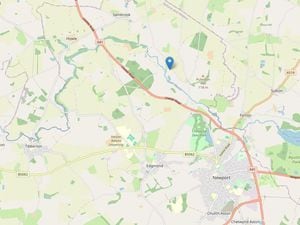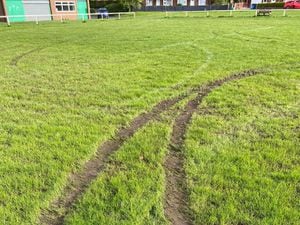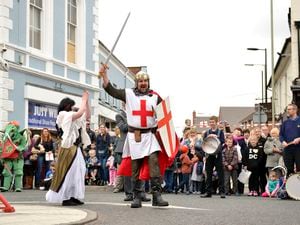'I still hear the screams': Falklands veteran on hunger strike over PTSD support
Gus Hales is on a hunger strike in Newport in protest over care for veterans with PTSD.
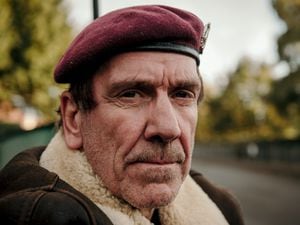
“On a quiet night I can sit there and hear the screams.”
The pain of war has never left veteran Gus Hales. Fighting in the Falklands War, on three tours of Northern Ireland, and serving in Belize and Hong Kong has left its scars – but not all scars can be seen.
The 62-year-old Nuneaton coalminer’s son was faced with a decision as to whether to enter the military, like his brother had, or go and work in the pits.
WATCH more on his campaign here:
He decided to join the army and in 1982 served as a Royal Engineer Paratrooper in the Falklands conflict.
“My work involved finding and clearing minefields. Imagine your worst nightmare, being in a minefield where your next move could blow your leg off while being shelled at the same time. Being put under shell fire is the most terrifying experience,” he says from next to a small pitched tent outside the Audley Court Combat Stress respite centre in Newport, which helps veterans with mental health issues.
The centre provides one to one and peer led support and outpatient treatment, but no longer offers residential support for veterans.

I meet with Gus 24 hours into a hunger strike and he admits he is already feeling light-headed. He feels he and other veterans have been abandoned after their service, saying that there needs to be more provision, investment, and help for those suffering with post traumatic stress disorder.
He hopes his protest will raise awareness of the issue.
As Gus recounts tales, it is clear why he feels so strongly.
“War stories,” he sighs, looking towards the skies, rubbing his hands together to keep warm.
Gus recalls seeing the bombing of the RFA Sir Galahad ship in 1982, considered to be the biggest British setback of the war at Fitzroy.
It is clearly not easy with his eyes welling up.
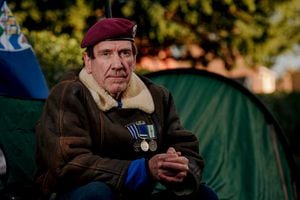
“I had come from Goose Green to Fitzroy on a chopper and the Galahad was coming in. We said to ourselves ‘they’re sitting ducks’, and within a couple of hours the ops room shouted ‘air raid warning red’,” he said.
“The next thing you know is there is a huge explosion that echoed around. I was in a machine gun, and suddenly men are being pulled off the Galahad with limbs hanging off and burns.
“Where it happened there were no medical facilities, blokes were taken into a community centre and were lying on the floor, badly burned and screaming. I was right in the middle of that, and you don’t come out of that experience in the same way you went in.”
'Seared on my memory'
He still hears the screams of pain and artillery now when he sits in his Mid Wales home in Builth wells where he lives with his wife Angela.
“It’s not like my imagination, they are echoing through my mind like it’s seared on my memory,” he says.
“Every memory comes with an emotional state. I’m not just seeing this, but experiencing the emotions that come with it – 36 years later and it can still tear me apart.
“It’s branded on me like a branding iron on my concious. I have learned to not proliferate the memory, because it’s the start of the narrative and if I follow the narrative too far it ends in a complete and utter breakdown. I have to say ‘don’t go there’. But that needs training and awareness.
“The Government is quite prepared to pay the bill for the sinking of the ships and the lost aircraft, but they should put some money towards the after care, because at the moment we have empty buildings and veterans on the streets.
“It is a modern day travesty.”
Gus, who is a convert to Buddhism, still suffers episodes, but the worst times were in the 10 years after he had left the army. “I was slowly driving myself crazy,” he said.
“The first real incident I remember was I going out to meet some people and having an overwhelming sense of anxiety that something was about to happen. I was restless. I’d never get a good night’s sleep. I’d always be on the edge, ready to go, always with that sense of being ready to explode into a kind of anger.
“This is how we were primed to go to the Falklands. We did drills and we were taught to cut people’s throats, you don’t come back from that a gentle being. You are brutalised, and you’re left with that afterwards.
“People talk about flashbacks and for me it would manifest in intense feelings in my body that would literally cripple me. I wasn’t able to move. I had a great melancholy and sadness of it all and that I was involved in it.”
Counselling
Gus sought help from Combat Stress at a treatment centre called Tyrwhitt House in Surrey where he was given counselling and respite care.
“It was very therapeutic, it gave you chance to meet other veterans and get your head together,” he said.
But Gus says he was discharged without explanation by a welfare officer three years ago, and has yet to receive an explanation as to why.
He added that he has been denied a discharge medical report.
Gus believes he is not alone and says he has spoken to other veterans with similar stories.
But his biggest fear is for the future of other veterans.
“What’s going to be there for the next wave of veterans? I don’t want them to be the same as me.”
Mr Hales says he could be there until Remembrance Sunday.
He said: "It's the 100th anniversary of the end of the First World War, where this condition first came light. It was called shell shock then, it's now called PTSD. You can't have all these gushing parades for our glorious dead when we are treating people who are alive in this way.
"This is not political, this is about veterans. It's about the veterans of the past, the present and those yet to come."
Sue Freeth, chief executive of Combat Stress, said she was concerned about Mr Hales' decision to go on hunger strike.
She said: “Mr Hales’ wellbeing is of paramount importance to us. We’re concerned with his decision to stage a hunger strike, especially in this wintry weather, and are keen to resolve this matter quickly
“At Mr Hales request, our Regional Operations Manager met with him today to discuss his concerns. Unfortunately, he decided not to speak to her. We also offered him the opportunity to meet with one of our clinical team for a mental health assessment, but he also refused this
“In the last three years, we’ve offered Mr Hales many opportunities to be reassessed for treatment with us if he wished. Sadly he’s not taken any of these offers up. We have offered him today an appointment with our Veteran Peer Support volunteer.
“Due to demand, we no longer offer open ended treatment but do provide further treatment as needed. Our aim is to help people recover their independence rather than remain dependent on us
“We really hope Mr Hales will engage with us so we can work with him to resolve his concerns."

